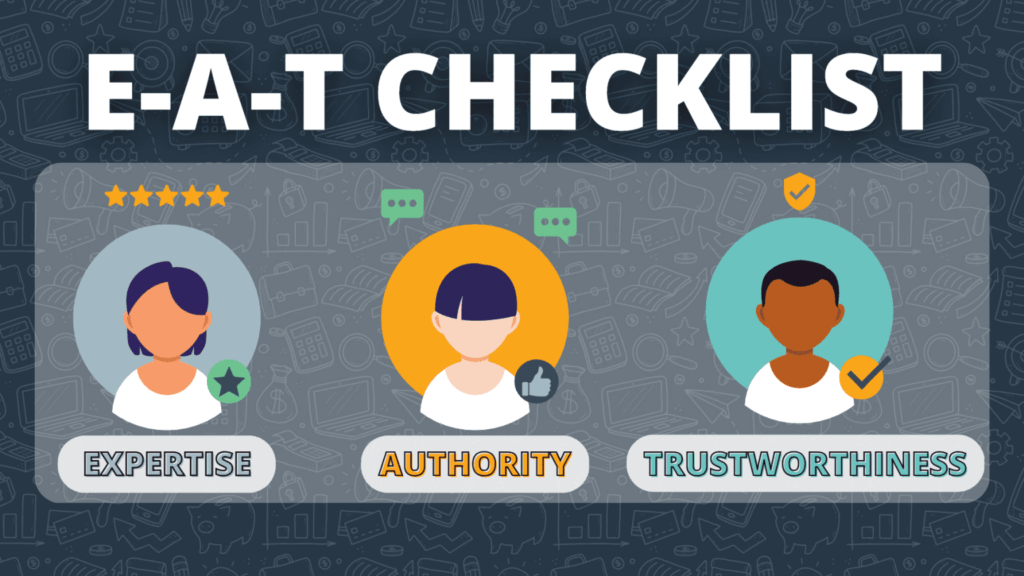Google E-A-T Formula for Content Success: Attract, Engage, and Rank
Have you ever typed a question into Google and noticed the same websites popping up at the top of the search results, no matter what you search for? It’s not magic; it’s Google’s complex algorithm prioritizing content it deems “helpful” to users. But what exactly makes content helpful in Google’s eyes? A recent study that analyzed a whopping 260,000 search results sheds some light on this.
This blog post will decode what Google loves (and what it doesn’t) when it comes to ranking content.
What Google Loves (and What It Doesn’t)

- E-E-A-T: Establishing Expertise, Authoritativeness, and Trustworthiness
Imagine you’re looking for medical advice. Would you trust information from a random blog or a website run by a licensed physician? Google prioritizes content written by experts. This doesn’t mean every author needs a Ph.D., but credibility is key. If you’re writing about home repairs, showcase your experience with DIY projects by including personal anecdotes or referencing past projects.
- Speaking the Same Language: Semantic SEO for Topic Mastery
Keywords are still important, but Google now rewards content that uses relevant sub-topics and related keywords. This shows your content comprehensively covers the subject matter. Think of it like having a conversation. You wouldn’t just repeat the same words; you’d use synonyms and discuss connected ideas. For instance, an article about “best laptops for students” might explore factors like processing power, battery life, and budget-friendly options.
- Speed Demons: Technical SEO for Faster Loading
Nobody likes a slow website. Google prioritizes content that loads quickly, so optimizing images and code is crucial. Faster loading times not only improve user experience but also signal to Google that your site is well-maintained. Consider tools like Google PageSpeed Insights to identify areas for improvement.
Content is King (But User Intent is Queen)
- Deep Dives vs. Quick Answers: Comprehensive Content Matches User Needs
The depth of your content depends on the user’s intent. If someone searches for “What is the capital of France?”, a short and sweet answer suffices. However, a search for “Best places to visit in France” requires a detailed and informative travel guide. Analyze the types of searches relevant to your content and tailor the depth accordingly.
- Understanding the “Why” Behind the Search: User Intent Drives Content Strategy
People search for things for different reasons. Informational searches aim to gather knowledge (“symptoms of the common cold”), while buyer intent searches are focused on making a purchase (“best laptops for students”). Understanding the user’s intent is crucial. For informational searches, ensure your content addresses all aspects of the topic and provides clear answers to potential questions. For buyer intent searches, focus on product comparisons, reviews, and highlighting features that address the user’s buying needs.
The Power of Authority: Building Trust and Ranking Higher

Imagine domain authority like your website’s reputation in the online world. Established and trustworthy websites with a history of publishing high-quality content consistently tend to rank higher in search results. Google sees these sites as reliable sources of information.
Here’s how domain authority works:
- Backlinks: The Currency of Trust
Think of backlinks as citations from other websites. When a reputable website links back to yours, it’s essentially giving you a vote of confidence. The more high-quality backlinks you have, the more trustworthy Google perceives your site to be. Earning backlinks organically shows Google that other websites find your content valuable and informative enough to reference.
- Quality Over Quantity: Building Relationships
Not all backlinks are created equal. A single backlink from a high-authority website in your niche carries more weight than several backlinks from low-quality or irrelevant websites. Focus on building relationships with other credible websites in your field and creating content so valuable they naturally want to link to it. Guest blogging on relevant websites and creating link-worthy infographics or studies are some strategies to consider.
- Building a Strong Foundation: Consistent Quality
Domain authority takes time and consistent effort to build. Google constantly analyzes your website’s content quality and backlink profile. By consistently publishing informative, well-researched content that adheres to SEO best practices, you demonstrate your expertise and commitment to providing value to users. This, in turn, sends positive signals to Google and helps establish your website as a trusted authority in your niche.
The Benefits of High Domain Authority
- Improved Search Rankings: Websites with high domain authority tend to rank higher in search results for relevant keywords. This means more organic traffic and increased visibility for your website.
- Enhanced Brand Credibility: A strong domain authority signifies trust and expertise in your field. This can lead to increased brand awareness and user confidence in your website’s content and products/services.
- Attracting High-Quality Backlinks: As your domain authority grows, it becomes more attractive for other websites to link back to yours. This creates a snowball effect, further boosting your website’s authority and ranking potential.
By understanding the importance of domain authority and implementing strategies to build it, you can significantly improve your website’s visibility and establish yourself as a trusted leader in your niche.
Conclusion: Creating Content that Ranks and Engages
By understanding what Google considers “helpful content,” you can create content that not only ranks higher but also genuinely informs and engages your readers. Focus on building expertise in your niche, using relevant keywords strategically, and keeping your website fast and user-friendly. Remember, in-depth content optimized for user intent is key. Finally, building your website’s authority takes time and consistent effort, but the rewards in search rankings and user trust are well worth it.
So, the next time you create content, keep these factors in mind. By following these guidelines, you can climb the Google rankings ladder and ensure your website reaches the right audience, ready to consume your informative and engaging content.







